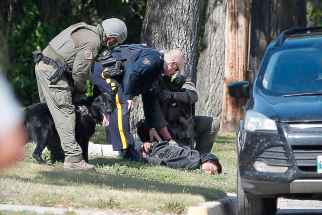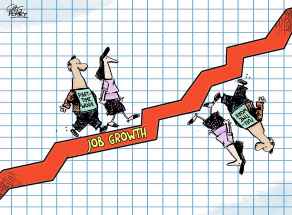Entrenched positions won’t resolve gun debate
Read this article for free:
or
Already have an account? Log in here »
To continue reading, please subscribe:
Monthly Digital Subscription
$0 for the first 4 weeks*
- Enjoy unlimited reading on winnipegfreepress.com
- Read the E-Edition, our digital replica newspaper
- Access News Break, our award-winning app
- Play interactive puzzles
*No charge for 4 weeks then price increases to the regular rate of $19.00 plus GST every four weeks. Offer available to new and qualified returning subscribers only. Cancel any time.
Monthly Digital Subscription
$4.75/week*
- Enjoy unlimited reading on winnipegfreepress.com
- Read the E-Edition, our digital replica newspaper
- Access News Break, our award-winning app
- Play interactive puzzles
*Billed as $19 plus GST every four weeks. Cancel any time.
To continue reading, please subscribe:
Add Free Press access to your Brandon Sun subscription for only an additional
$1 for the first 4 weeks*
*Your next subscription payment will increase by $1.00 and you will be charged $16.99 plus GST for four weeks. After four weeks, your payment will increase to $23.99 plus GST every four weeks.
Read unlimited articles for free today:
or
Already have an account? Log in here »
Hey there, time traveller!
This article was published 30/08/2018 (2660 days ago), so information in it may no longer be current.
“Gun control.”
With the possible exception of “reproductive rights,” there likely isn’t a two-word combination that has become more divisively politicized in the current societal conversation.
Those who are committed to addressing firearms-related violence in Canada — including both homicides and suicides — tend to favour greater restriction on the types of weapons available to the public and the manner in which they can be legally obtained. Of particular interest to gun-control advocates are handguns and military-style assault rifles, neither of which have any real practical application for civilians, hunters or rural residents who keep firearms at hand to protect their livestock from predation.
Those who oppose gun control are inclined to fly into a bit of a tizzy at the mere utterance of the words, retreating to familiar cries that any discussion of weapons restriction represents “the thin edge of the wedge” in a process that will inevitably lead to the government “coming for your guns.”
There is, as evidenced by reactions to this week’s report that the federal government will consider an outright ban on certain firearms, simply no middle ground on which to have a measured, collaborative and hopefully productive conversation about guns.Canada clearly should not– and, thankfully, does not — seek to emulate the gun-related attitudes and politics of its southern neighbour.
On Tuesday, Prime Minister Justin Trudeau released the mandate letters given to new cabinet ministers; among the assignments for Border Security and Organized Crime Reduction Minister Bill Blair is the direction to “lead an examination of a full ban on handguns and assault weapons in Canada…”
Here’s what not one single person said in response to the mandate letter’s release: “An examination of that issue seems reasonable, given the perceived increase in gun-related violence in Canada; we should seek expertise from both sides and work toward a compromise that satisfies both proponents and opponents while at the same time making Canada safer for its citizens.”
Instead, the heated discussion broke along the expected lines of ideological demarcation: guns bad, or government bad for taking away guns. Neither side seemed interested in the fact Mr. Blair’s instructional sentence regarding a possible gun ban ends in the following manner: “… while not impeding the lawful use of firearms by Canadians.”
Gun-control advocates are correct when they assert that ease of access to firearms — particularly handguns and military-style weaponry — contributes to gun-involved violence. All one needs to do is cast a cautious glance south of the border, where gun culture is embedded, guns are readily available and the gun-related homicide rate far outstrips that of other high-income countries.
Contrast that to Australia, which introduced comprehensive gun control 22 years ago, reducing their rate of mass shootings to zero. Simply put, fewer guns necessarily means less gun violence.
But gun-ownership defenders are also correct in saying a ban will not deter those who employ firearms for criminal and violent purposes. Handgun ownership and transport are heavily restricted in Canada now, but those regulations — and any law that might result from Mr. Blair’s study — are hardly front-of-mind considerations for individuals bearing arms with wrongful intent.
Canada clearly should not — and, thankfully, does not — seek to emulate the gun-related attitudes and politics of its southern neighbour. But it also cannot pattern its gun response after that of Australia, which is an isolated island continent and not a nation sharing a largely undefended border with the most gun-crazed country on Earth.
Canada needs its own plan for dealing with gun-related violence. And the creation of any such strategy must begin with the willingness to have a serious adult conversation.









